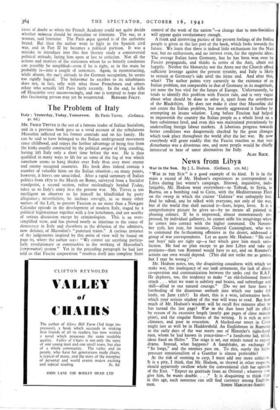The Problem of Italy
MR. PAOLO TREVES is the son of a famous leader of Italian Socialism, and in a previous book gave us a vivid account of the tribulations Mussolini inflicted on his former comrade and on his family. He can be said to have belonged to the Italian underground movement since childhood, and enjoys the further advantage of being free from the kinks usually contracted by the political emigre of long standing, having left Italy only a short time before the war. He is thus qualified in many ways to lift for us some of the fog of war which somehow seems to hang thicker over Italy than over most enemy and enemy occupied countries. His book does indeed contain a number of valuable hints on the Italian situation ; on many points, however, it leaves one unsatisfied. After a rapid summary of Italian politics from 1870 to the March on Rome, surveyed from a Socialist standpoint, a second section, rather misleadingly headed Today, takes us to Italy's entry into the present war. Mr. Treves is too intelligent an observer to let himself be blindfolded by parry allegiance ; nevertheless, he inclines strongly, as so many other writers of the Left, to present Fascism as no more than a Newgate Calendar episode in the development of modern Italy, staged by a political highwayman together with a few henchmen, and not worthy of serious discussion except by criminologists. This is an over- simplified view, and has proved nearly as injurious to the cause of
demcicracy in Italy and elsewhere as the delusion of the admirers, now defunct, of Mussolini's "punctual trains." A curious instance of the judgements inspired by this point of view will be found on page 65, where the author says : "We cannot see anything particu- larly revolutionary or constructive in the working of Mussolini's (corporative) system." Yet in the preceding paragraph he had just told us tfiat Fascist corporatism "resolves itself into complete State control of the work of the nation "—a change that to non-Socialists will appear quite revolutionary enough.
A frank and interesting picture of the present feelings of the Italian people is given in the last part of the book, which looks towards the future. We learn that there is indeed little enthusiasm for the Nazi war, but no enthusiasm, and no interest even, for the opposite ideas. The average Italian hates Germany, but he has been won over by Fascist propaganda, and thinks in terms of the Axis, albeit not happily. Neither the Monarchy nor the Army nor the Church afford sufficient leverage against the present tyranny, and Italy is likely to remain at Germany's side until the bitter end. And after that, what? The author points very earnestly to the existence of an Italian problem, not comparable to that of Germany in its magnitude, yet none the less vital for the future of Europe. Unfortunately, he tends to identify this problem with Fascist rule, and is very vague about what should be done to solve it, apart from the overthrow of the Blackshirts. He does not make it clear that Mussolini did not create the Italian problem, but merely aggravated it further by attempting an insane solution. Long before Fascism had helped to impoverish the country the Italian people as a whole lived on a bare subsistence level, and even this was maintained precariously by underselling foreign labour markets. A laborious progress towards better conditions was dangerously checked by the great changes which took place throughout the world after the last war. By now everybody will grant readily that the Fascist reaction to that vast disturbance was a disastrous one, and most people would be chiefly interested to hear of saner alternatives for Italy.
ALAN Rocx.


























 Previous page
Previous page